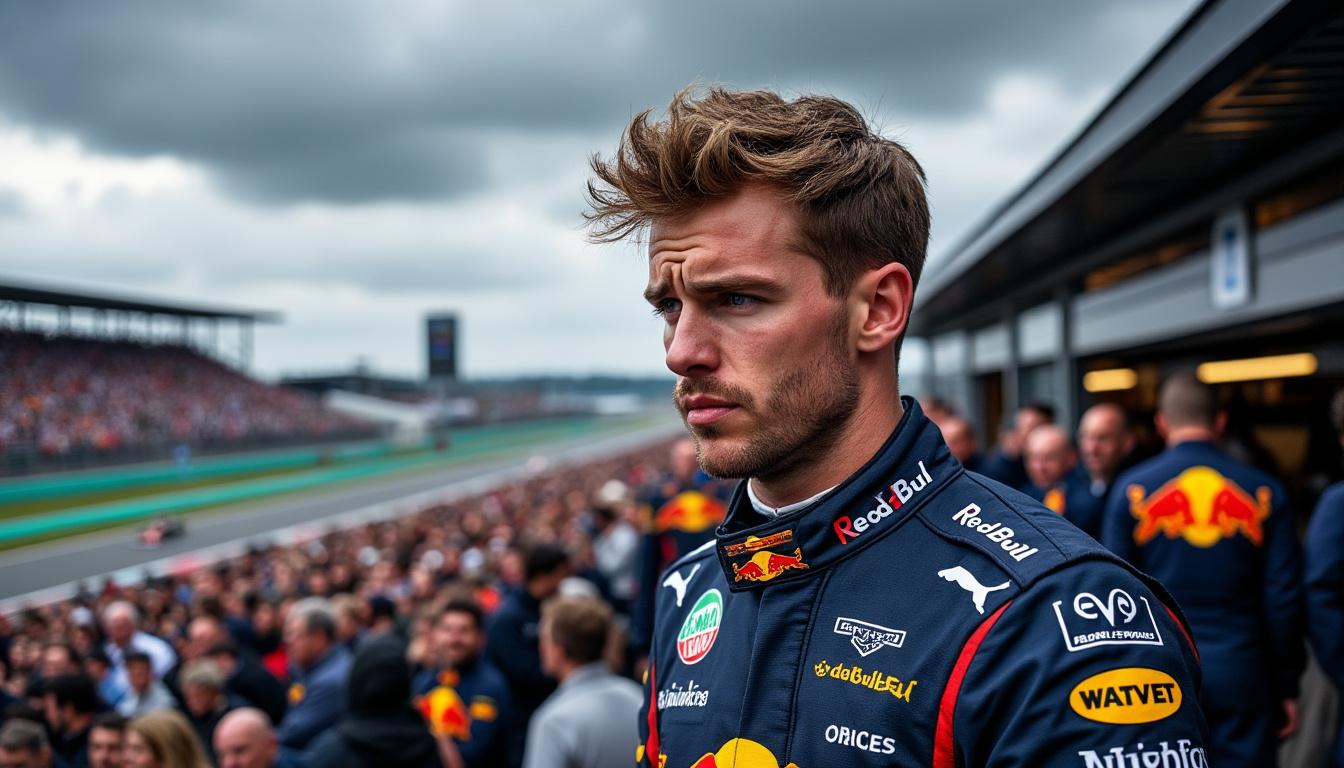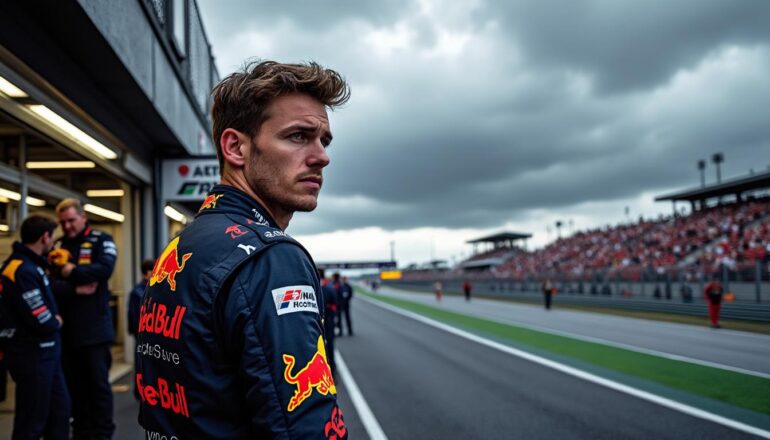The Hungarian Grand Prix has turned into an unexpected battleground for the Red Bull team this weekend. With Max Verstappen starting from eighth on the grid, the stakes have never been higher. In an atmosphere charged with uncertainty, Red Bull’s technical director expressed the frustration of a team struggling to find its footing.
As the engines roar and excitement builds, the challenges faced by Verstappen and Yuki Tsunoda underscore a sense of unease within the ranks. The technical woes and lack of grip have left fans and team members alike questioning the performance of the RB21. With comments from team advisor Helmut Marko illuminating the bleak outlook, an atmosphere of rising tensions surrounds the team. Despite the glitz and glamour of F1, this weekend’s reality is riddled with obstacles, leaving one to wonder: what has gone wrong at the Hungaroring? As we dig into the details of qualifying, it’s clear that the road ahead will require both grit and determination.

Despite Red Bull Racing’s historic dominance in recent Formula 1 seasons, Max Verstappen has raised eyebrows with his bleak outlook for the 2025 F1 season. As fans eagerly await the unfolding drama of the next championship, Verstappen’s comments reveal a sense of uncertainty and concern that could shake the foundations of the team’s winning legacy. This sentiment stems from various factors that could potentially hinder Red Bull’s chances of securing victories. Here, we delve into Verstappen’s predictions, the implications for the team, and how this might reshape the competitive landscape in F1.
What factors contribute to Verstappen’s pessimistic outlook?
Verstappen’s foreboding prediction for the upcoming season could be attributed to a multitude of elements. Firstly, the intense evolution of car technology and regulatory changes are expected as F1 drives towards greater sustainability. The introduction of new power units and adjustments to aerodynamics could play a substantial role in leveling the playing field among teams. With Red Bull traditionally excelling in technical development, the new rules present a unique challenge.
Additionally, the fierce competition from teams like Mercedes and Ferrari cannot be underestimated. These teams have consistently demonstrated their capabilities to bounce back from setbacks. Verstappen acknowledged this during interviews, emphasizing that rival teams are constantly progressing and adapting. “Every team will get stronger with the new regulations. It’s not just about us anymore,” he noted, underlining a shifting dynamic within the sport.
Moreover, Verstappen has pointed out that maintaining team morale and driver confidence will be critical. If the season begins with struggles, it could lead to a downward spiral, affecting performance on the track. The psychological aspect of racing is often overlooked, but as the saying goes: “You win or you learn.” For Red Bull, the learning curve may be steeper than anticipated in 2025.
How might team dynamics affect performance?
When discussing potential roadblocks for Red Bull, it’s crucial to consider the team dynamics. The relationship between drivers, engineers, and management plays a pivotal role in how effectively a team performs. In Verstappen’s case, his experience as a leading driver means his insights carry weight, but they also create pressure to deliver results.
In 2025, Red Bull will likely introduce new talents to their roster, which could significantly influence how the team operates. Integrating a young driver into a well-established team like Red Bull can be challenging. There is a need for synergy between the drivers and the pit team; any friction can impact race strategy and results. Verstappen, accustomed to the pressure of leadership, may find himself mentoring a newer driver, potentially diverting focus from his performance.
Moreover, tension can arise from competition for supremacy within the team itself. If a burgeoning rivalry between teammates emerges, it could lead to on-track incidents, affecting overall performance and coordination. Verstappen will have to balance his ambitions with the team’s collective goals, a situation that could overshadow the camaraderie essential for success.
What technological hurdles is Red Bull facing?
The technological landscape of Formula 1 is continuously evolving, and Verstappen’s apprehension about the future may stem from Red Bull’s reliance on innovation. Currently, the Verstappen-led team navigates various technological hurdles, including power unit performance, weight distribution, and aerodynamic efficiency. The complex nature of car design means that even minor adjustments can lead to significant differences in performance, making the upcoming regulations daunting.
In the 2025 season, the introduction of hybrid technology is anticipated to shift performance benchmarks across F1. Red Bull’s historic ability to optimize their power unit must adapt to maintain competitive edge. As highlighted by Verstappen in recent interviews, the traditional methods of tuning and fine-tuning must embrace cutting-edge technologies, such as improved battery management and energy recovery systems. This shift might leave conventionalists, including those within Red Bull, grasping for solutions to stay ahead.
Additionally, Verstappen expressed concern over ongoing development programs. Continuous innovation takes time and comes with risks. As car designs are tested and refined, the risk of encountering performance issues is heightened. “We are trying to find the right path, but it can be a long struggle, especially when you’re not hitting your targets,” Verstappen commented, emphasizing the uncertainty overshadowing technical progress.
Can Red Bull reclaim their competitive edge?
While the grim forecast provided by Verstappen paints a challenging picture, history teaches us that F1 teams capable of profound transformation can bounce back to claim their glory. Red Bull’s resilience cannot be underestimated, and the efforts made by their engineering team could play a pivotal role in determining their fate in 2025.
The team’s management is acutely aware of the necessity to refine their strategies based on Verstappen’s insights and those of his teammate. The restructuring of technical teams and collaborations between engineers and drivers can pave the way for a renewed competitive spirit. As Roland Dane, former team principal, stated, “In F1, a team must adapt and evolve or fade away.” This sentiment is a testament to Red Bull’s capability to innovate.
Moreover, the culture within Red Bull promotes a relentless pursuit of excellence. Utilizing data analytics and simulations, they can glean insights far beyond track performance, ensuring they remain one step ahead. If executed effectively, these innovations could lead to a resurgence that surprises the grid during the 2025 season.
As the anticipation grows, the F1 community remains eager to see how Red Bull responds to the challenges ahead. The forthcoming championship will serve as a litmus test for the team’s resilience. Those who understand the complexities of this sport recognize that fortune can shift abruptly—one pivotal race could change everything, igniting hopes of triumph despite the seemingly insurmountable odds.
In summary, while Verstappen has raised valid concerns regarding a winless 2025 season for Red Bull, the narrative is far from set. Teams have historically overcome obstacles when fueled by innovation, determination, and collective effort. The outcome remains uncertain, but the ability of Red Bull Racing to adapt will ultimately determine their fate in an increasingly competitive Formula 1 landscape.


